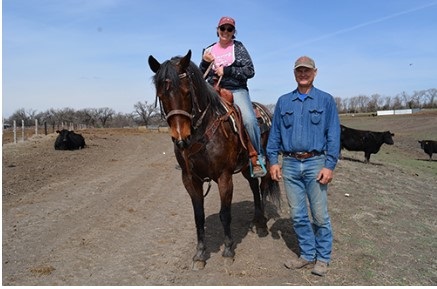WASHINGTON, D.C. – Republican members of Congress have introduced legislation to prevent countries like China and Russia from investing in U.S. agriculture.
Amid global food shortages, New York Representative Elise Stefanik and Rick Crawford of Arkansas are spearheading the “Promoting Agriculture Safeguards and Security” (PASS) Act. that would prevent adversarial countries from acquiring American companies .
Stefanik says food security is national security, and she will stand against our foreign adversaries as they attempt to exploit potential vulnerabilities and assert control over America’s agricultural industry. The two lawmakers pointed to concerns raised by a report released in May by the U.S.-China Economic and Security Review Commission. The report looks specifically at China’s interest in U.S. agriculture, citing China’s lack of arable land, environmental pollution and reliance on imports.
The bill would specifically prevent countries like China, Russia, Iran, and North Korea from being allowed to buy American agricultural companies, citing them as “prohibited.” The bill also would include listing agriculture and biotechnology related to agriculture as “critical infrastructure.” The bill also would place the agriculture secretary as a standing member of the Committee on Foreign Investment in the U.S. (CIFIUS).
“Adversarial nations like China continue to threaten our homeland, using tactics like buying American agriculture companies and stealing agricultural research to undermine our economy,” Stefanik says. Fox News says the food security issue is a global problem because of the war in Ukraine, which has led to global food shortages. Republicans say Russia is using food manipulation as a weapon in its invasion of Ukraine.
The report also dives into several possibly security risks for U.S. agriculture from Chinese investments:
— Chinese acquisition of U.S. hog herds may help save China money, but it reduces the need for U.S.-sourced production.
— Further Chinese investment in U.S. agricultural assets could give China undue leverage over U.S. supply chains.
— China’s access to U.S. agricultural technology could erode U.S. competitiveness in ag technology that supports food production.
— China’s “illicit acquisitions” of U.S. seed technology is jumpstarting China’s development of biotech seeds, depriving U.S. companies of revenue. The thefts also offer China “an opportunity to discover vulnerabilities in U.S. crops.”
The commission report specifically spotlights plans by a company, Fufeng Group, near Grand Forks, North Dakota. The $700 million project is Fufeng’s first agricultural processing investment in the U.S.
Eric Chutorash, chief operating officer for Fufeng USA, held a video forum with the Grand Forks Herald back in March. Chutorash explained what led the company to seek a project in North Dakota.
“Corn is our biggest input cost, so we saw there weren’t other processors in the area and there was corn availability, so that was, I would say, in the strong positive column,” Chutorash said, also citing North Dakota’s natural gas supplies.
As the Grand Forks Herald has documented, the project has led to complaints that city and local economic development leaders shouldn’t have negotiated to bring Fufeng to the city. The project has raised typical development concerns over water usage and environmental impact of the area. The newspaper noted there has been no public evidence suggesting Fufeng plans to engage in espionage.
Sen. Kevin Cramer, R-N.D., has raised concerns about the project, which include suggesting the project should be ended. “Our value chains and our supply chains being so tied to our adversaries is a terrible strategic error that’s been made in the past, and we need to correct it going forward,” Cramer said in an interview with WZFG Radio in early June.
 Rep. Dan Newhouse, R-Wash., also introduced a bill shortly after the commission report came out. His bill also would prohibit the purchase of public or private agricultural land by Chinese foreign nationals. It would also prevent those companies or groups from participating in most USDA farm programs other than those tied to food safety.
Rep. Dan Newhouse, R-Wash., also introduced a bill shortly after the commission report came out. His bill also would prohibit the purchase of public or private agricultural land by Chinese foreign nationals. It would also prevent those companies or groups from participating in most USDA farm programs other than those tied to food safety.
Newhouse first raised concerns last year and added language to USDA’s funding bill that would make it illegal for the Chinese state-owned entities to own agricultural land or participate in USDA programs.
About 37.6 million acres, or about 2.9% of the nation’s total farm, ranch and forest land, were under foreign ownership in 2020, the latest year for which data was available
There is no word how the legislation, if passed, would affect the EB-5 immigrant visa program. That allows foreign nationals to be fast-tracked for U.S. citizenship when the invest up to $800,000 in a new commercial enterprise that will benefit the U.S. economy and create at least 10 full-time U.S. jobs per investor. Currently the program is administered by U.S. Citizenship & Immigration Services (USCIS).
South Dakota government officials have actively pursued investors under the EB-5 visa program from China, North Korea and other countries to participate by investing in ag industries in the state like dairies in return for permanent residency. One such project, a beef packing plant located in Aberdeen, SD, that was announced in 2006, resulted in a massive EB-5 scandal that ended up costing the state’s taxpayers millions of dollars.
In 2015, citing corruption and administrative blunders, the federal government shut down South Dakota’s EB-5 investor visa program for those wealthy people from China and other countries who had invested to become U.S. residents.
The program at the federal level also came under scrutiny. When the EB-5 visa and regional center programs were established in 1990, Congress intended for them to help spur investment in rural and economically depressed areas. In Washington, evidence of rampant fraud put the EB-5 visa program on the shelf for the most part.
But U.S. Senator Mike Rounds (R-SD), who was governor of South Dakota and under whose administration the state’s EB-5 program imploded by 2013, continues to be a vocal proponent of the ‘visa for payment’ program.
After having lapsed over the summer of 2021, the EB-5 Regional Center Program (“RC Program”) was reauthorized as part of the Omnibus Spending Bill passed by Congress in March 2022. The EB-5 Reform and Integrity Act of 2022 reauthorizes the EB-5 program through Sept. 30, 2027, for a total of five years.
With the reauthorization of the EB-5 Program, any pending applications from immigrant investors that have been on hold since the program lapsed last summer will begin to be processed, and there will likely be a coinciding influx of applications from immigrant investors hoping to take advantage of fast-tracking U.S. citizenship through their wallets.
But just how the most recent introduction of the “PASS” Act will impact those EB-5 opportunities, remains to be seen.












